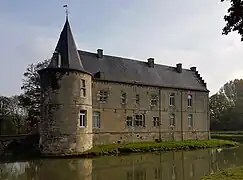Voerendaal
Voelender | |
|---|---|
 Town of Voerendaal | |
 Flag  Coat of arms | |
.svg.png.webp) Location in Limburg | |
| Coordinates: 50°53′N 5°56′E / 50.883°N 5.933°E | |
| Country | Netherlands |
| Province | Limburg |
| Government | |
| • Body | Municipal council |
| • Mayor | Wil Houben (VVD) |
| Area | |
| • Total | 31.52 km2 (12.17 sq mi) |
| • Land | 31.51 km2 (12.17 sq mi) |
| • Water | 0.01 km2 (0.004 sq mi) |
| Elevation | 92 m (302 ft) |
| Population (January 2021)[4] | |
| • Total | 12,466 |
| • Density | 396/km2 (1,030/sq mi) |
| Demonym | Voerendaler |
| Time zone | UTC+1 (CET) |
| • Summer (DST) | UTC+2 (CEST) |
| Postcode | 6310–6312, 6343, 6367 |
| Area code | 045 |
| Website | www |
Voerendaal (Dutch pronunciation: [ˈvuːrə(n)daːl] ⓘ; Limburgish: Voelender) is a municipality and a town in the southeastern Netherlands.
Population centres
- Barrier
- Colmont
- Craubeek
- Dolberg
- Fromberg
- Heek
- Hellebeuk
- Klimmen
- Koulen
- Kunrade
- Mingersberg
- Opscheumer
- Overheek
- Ransdaal
- Retersbeek
- Termaar
- Termoors
- Ubachsberg
- Voerendaal
- Weustenrade
- Winthagen

Dutch topographic map of the municipality of Voerendaal, June 2015
History
The Romans left the ruins from a Roman villa rustica as a legacy. In 1049 pope Leo IX initiated the Catholic Church - Sint Laurentiuskerk. During medieval times many castles were built: Cortenbach, Haeren, Puth, Rivieren and Terworm. Also castles such as Hoenshuis and Overst Voerendaal. The area was mined for marl (mergel in Dutch) and coal.
Transportation
Railway Station:Klimmen-Ransdaal, Voerendaal
Notable people
- Roel Brouwers (born 1981) a Dutch former footballer with 289 club caps, lived in Voerendaal while playing for Borussia Monchengladbach
Gallery
 Church: Sint Laurentiuskerk
Church: Sint Laurentiuskerk.JPG.webp) Monument near church
Monument near church.JPG.webp) Cortenbach Castle
Cortenbach Castle Rivieren Castle - Voerendaal
Rivieren Castle - Voerendaal
References
- ↑ "Burgemeester en wethouders" [Mayor and aldermen] (in Dutch). Gemeente Voerendaal. Archived from the original on 6 May 2014. Retrieved 4 December 2013.
- ↑ "Kerncijfers wijken en buurten 2020" [Key figures for neighbourhoods 2020]. StatLine (in Dutch). CBS. 24 July 2020. Retrieved 19 September 2020.
- ↑ "Postcodetool for 6367ED". Actueel Hoogtebestand Nederland (in Dutch). Het Waterschapshuis. Retrieved 4 December 2013.
- ↑ "Bevolkingsontwikkeling; regio per maand" [Population growth; regions per month]. CBS Statline (in Dutch). CBS. 1 January 2021. Retrieved 2 January 2022.
External links
 Media related to Voerendaal at Wikimedia Commons
Media related to Voerendaal at Wikimedia Commons- Official website
This article is issued from Wikipedia. The text is licensed under Creative Commons - Attribution - Sharealike. Additional terms may apply for the media files.
